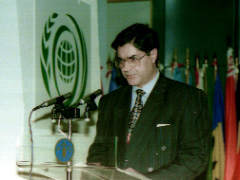


UNITED NATIONS INDUSTRIAL DEVELOPMENT ORGANIZATION (UNIDO) - ORGANISATION DES NATIONS UNIES POUR LE DEVELOPPEMENT INDUSTRIEL - ORGANIZACION DE LAS NACIONES UNIDAS PARA EL DESARROLLO INDUSTRIAL | ||
Mr. Ahmed Rafik Ben Brahim, Director, Agro-Based Industries Branch, United Nations Industrial Development Organization (UNIDO) | ||

On behalf of the Director General of UNIDO, I would like to express our great appreciation of this initiative taken by FAO in organizing this most important event which is aimed at redressing the imbalances in food availability facing the world. I am also pleased to convey to FAO's Director-General, Mr. Jacques Diouf, our warmest thanks for inviting UNIDO to attend this meeting and to address this honourable audience. We fully subscribe to the goals and objectives of the decade of Food for All. The problem of food security is not only linked to agricultural production per se; it is also related in a significant measure to processing and distribution. For instance, 98 percent of agricultural production is processed in developed countries, whereas only 38 percent is processed in developing countries. The value added by processing per ton of agricultural production in developed countries is US$ 184 compared to only US$ 40 in developing countries. Surely, these figures give more than just a hint of the action to be taken and the efforts needed to face the challenge. Furthermore, food availability should be seen in terms of time, space and also in terms of access to food, which requires infrastructure and especially a transportation system so that goods and people can reach the market place and, even more importantly, access implies purchasing power to be able to buy food. It is UNIDO's view that industrial development will create the jobs that will enable people to have access to food markets. This includes industrial processing of agricultural production to provide nutritious food under hygienic conditions. UNIDO's role in helping to meet this challenge is quite obvious. First, the rate of processing of agricultural production in developing countries must be raised from the present low of 38 percent. This can be achieved by a concerted effort to improve the investment climate, identify and stimulate markets, introduce environmentally-sustainable technologies and develop the all important human resources in these countries. Not only must this rate be raised but existing food processing enterprises should also be helped to reduce waste, raise quality and safety levels and to operate profitably. Second, other natural resources must be processed further to add value for export and to substitute for costly imports, thereby creating jobs and incomes so that people can afford the better food so produced. In fact, manufacturing of an ever-increasing range of goods must also be promoted for the same reason. Third, transport and trade infrastructure must be improved for the sake of the food processing industries besides a more attractive investment climate for industry in general. Together with long-sighted policies such measures will, we believe, make a substantial contribution to achieve the objectives of the food decade. In the context of the deep reform process that UNIDO has carried out during the last three years to ready itself to face the challenges of the twenty-first century, linking industry to agriculture has been retained as a major priority, especially targeting Africa and the least developed countries. In that vein, UNIDO has developed, promoted and implemented a considerable number of programmes and projects aimed at increasing local capacity in agro-based industries, with particular emphasis on small- and medium-scale industry and the role of women in that field, in consonance with the goals and objectives of the World Summit for Social Development and the Fourth World Conference on Women. More recently, on 23 October 1996, African Heads of State and Governments assembled in Abidjan, Côte d'Ivoire, have launched, with the sponsorship of UNIDO, the Alliance for Africa's Industrialization. In their Declaration they emphasized that the industrial sector has a fundamental role to play in the attainment of a durable solution to Africa's social and economic crisis, especially in poverty alleviation, income and employment generation through agro-processing. Thus UNIDO looks forward to being closely associated with the definition and implementation of the concrete programmes and activities that will result from the deliberations of this World Food Summit and to contributing its considerable knowledge and expertise to the pursuit of its goals and objectives. I wish you all success in your fundamental endeavour. | ||
|
|
|
|

 |